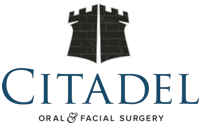Jaw Surgery (Orthognathic Surgery)
Misalignment of your teeth or underlying jaws may have a significant impact on your current or future jaw/facial function. Furthermore, discrepancies in the alignment of your teeth and jaws can affect your appearance and facial balance in a negative way. Naturally, every individual has a different perception on what may be acceptable from an aesthetic point of view, however when jaw and teeth alignment are improved, improved dental and facial aesthetics generally follow.
Generally, an orthodontist is able to successfully treat dental crowding and other misalignments of the teeth. However sometimes it is necessary to consider surgery to change the underlying skeletal or bony structure to provide an ideal or even acceptable dental appearance, stability and function – the ability to chew effectively. This type of surgery is termed "orthognathic (or″thog-na´thik) surgery", or commonly known as "jaw surgery". The surgeons at Citadel are trained to diagnose and treat abnormalities of the facial bones and soft tissues.
Signs of a combined orthodontic and jaw alignment problem may include:
- difficulty chewing or digesting food
- inability to get front teeth to bite together
- speech difficulties
- excessive wear or loosening of teeth
- accidental cheek biting
- inability to get your lips together comfortably
- a chin that appears too prominent or not prominent enough
- excessive showing of gums above your upper teeth
- an upper lip that appears too long or too thin
- an asymmetric appearance to top or bottom teeth, jaws or chin
- TMJ (jaw joint) problems
The Process
A thorough history and examination always leads the way. Photographs, radiographs ("x-rays") and molds of the teeth will typically all be obtained to allow detailed analysis. This analysis, coordinated between the orthodontist and surgeon, will determine the treatment plan options presented to you.
If a combined orthodontic/surgical solution is right for you, the treatment regime usually consists of orthodontic preparation ("braces") for a period of time, followed by the surgical procedures, and then a shorter period of orthodontic work to refine the final result.
Surgically, the lower jaw can be moved forward or backwards, and the upper jaw can be widened, moved up or down, and forward or back as needed to provide a proper relationship between the upper and lower teeth, the upper and lower jaws, and the face as a whole. The chin can also be moved forward and back, and also lengthened or shortened vertically if needed. The movements are all carefully planned out and executed with precision.
Procedures are generally all done from inside the mouth to avoid any visible scarring and minimize the recovery. Depending on the exact procedures done, the surgical portion may just be a short outpatient procedure (go home right afterwards), or it may require a short stay in the hospital in the more complex cases or if other medical conditions warrant it.
In almost all cases some movement and function of the jaw is allowed to occur immediately following surgery, and only very rarely is it necessary to "wire the jaws shut", as was done in the past.
Recovery is highly variable depending on the procedures you have done. The expected amounts of temporary swelling and discomfort, as well as interruption in normal diet, will be discussed with you. In all cases, appropriate medications and instructions will be provided to optimize your comfort and healing and reduce the chance of complications. Of course all surgical procedures carry with them some risks, but the rate of any serious complications for these somewhat routine procedures are extremely low.
Your Citadel surgeon will discuss any relevant risks with you, and all opportunity given for any concerns to be addressed.
Conclusions
Orthognathic (jaw) surgery has allowed many people of all ages to greatly improve the health and function of their teeth and jaws. In combination with orthodontic care, moving jaw and facial bones to a more harmonious position can affect chewing, speech and appearance in a positive way, and often enhance the long-term stability of the orthodontic result.
That said, this is generally elective surgery, and so it is essential that you take the time to understand any proposed treatment plans, the risks and benefits associated with them, and make an informed decision regarding your health. Citadel Oral & Facial Surgery has the training, knowledge and experience to help you with these decisions.
Please review our section on post-operative instructions.

